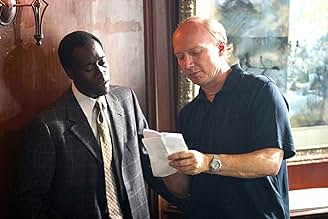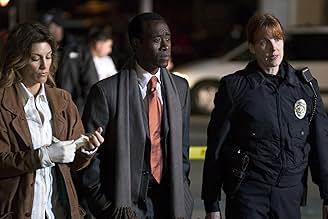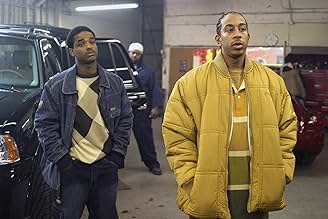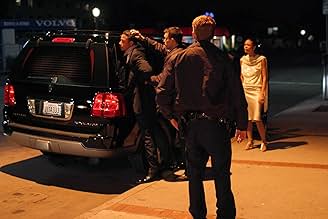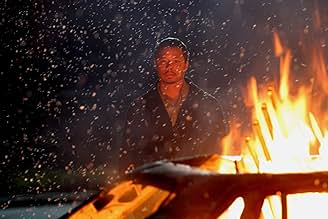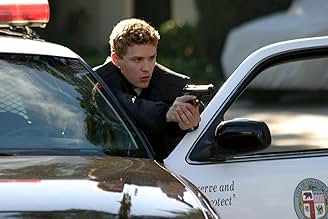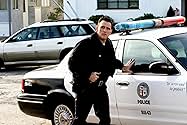Las vidas de varios ciudadanos de Los Ángeles colisionan en una serie de historias entrelazadas de identidad, perdida y redención.Las vidas de varios ciudadanos de Los Ángeles colisionan en una serie de historias entrelazadas de identidad, perdida y redención.Las vidas de varios ciudadanos de Los Ángeles colisionan en una serie de historias entrelazadas de identidad, perdida y redención.
- Dirección
- Guionistas
- Elenco
- Ganó 3 premios Óscar
- 66 premios ganados y 112 nominaciones en total
Thandiwe Newton
- Christine
- (as Thandie Newton)
Eddie J. Fernandez
- Officer Gomez
- (as Eddie Fernandez)
Opiniones destacadas
"Crash" is a superbly made film. The actors are first rate, the camera style is engaging, and production value is tops. And despite all this, I would never recommend it to anyone. Why? I'll explain in my 4th paragraph but first let's talk about the story.
This film follows the lives of a dozen or so people over the course of 2 days all living in Los Angeles. The opening scene gives us the aftermath of some ambiguous tragedy (the titular "crash"), and the next scene flashes back to "yesterday" and shows us the events in these people's seemingly unrelated lives, leading up to that opening moment. If you've seen "House of Sand and Fog" (the #1 Feel Bad Movie of the 2000s), you'll recognize an identical sort of chronology and foreboding tone--so similar that I wonder if the Crash filmmakers were somehow involved in House as well. Both films are very powerful and effective at what they aim to do, and that is, simply put, to disturb us.
Disturb us it does. Within the first 15 minutes, we see things that are so disturbing to the pit of our souls that I almost shut the movie off twice. Racism, hate, justified racism, justified hate, brutal stereotypes. The film masterfully shows us not only the worst quality of humankind but it scrutinizes the reasons why humans are this way. There's no good guy/bad guy; it's all bad guys. The first 15 mins is designed to make us hate almost every character, if not every race. By showing the atrocity that each race supposedly inflicts on the other, it paints us a Hatfield-McCoy cycle of hatred that has no known origin. It just exists and burns hotter. Non-whites are subverted by white society, so they exact revenge by committing crimes against white people which in turn causes the white police to hate and abuse non-white people who in turn become criminals against white people. The cycle of hate is not only explained but validated in a well-crafted, brutally told, highly disturbing way.
Which leads me to the 4th paragraph where I explain why I would never recommend this film. It's because IT JUST MAKES YOU FEEL BAD. For nearly 2 hours you get the same feeling you get when you watch too much cable news. And just as psychologists warn that watching too much news leads to depression, I would say the same can be said of films like this which, like the news, expose and scrutinize the absolute worst of humanity.
But then one might say that films like this are necessary to inspire change. Normally I would agree, and I'm sure that that's the intent of the filmmakers here. But let me ask you: who needs to change? Answer: racists and bigots. But are racists and bigots really going to be watching "Crash", stroking their beards and saying "Golly, I need to stop being a racist"? Probably not. And that is the film's undoing. By taking a heavy, ponderous, complex look at racism and hate, it alienates the fury-driven haters who most need to grasp this message. And instead "Crash" merely preaches to the choir, making the choir feel gawd awful lousy about the state of the world.
The film attempts to lead us to redemption, and there is at least 1 truly powerful scene of triumph that's worth the price of admission. However, other subplot resolutions seem a bit contrived, if not completely unnecessary, such as one character's climactic tragedy & epiphany which was so random I literally burst out laughing (the moral of the story being: don't wear socks indoors!). Ultimately "Crash" tries to tie things up neatly with a positive message, but it's precisely this neat tie-up, simultaneously with every sub-plot, that feels a bit contrived and ultimately unbelievable. At the risk of cutting out half the award-winning cast, perhaps the film should have focused on just 1 story & resolution, rather than pulling the "Fantasy Island" formula of having half a dozen stories wrap up neatly in the last 10 minutes.
Ultimately, despite its excellent presentation and first class acting, "Crash" couldn't sell me on its optimistic spin and instead left me feeling pretty horrible about the reality of living in a world where racists don't often have magical transformations. If you understand what I'm saying, you might want to skip this flick because, regardless of how it ends, the subject will just make you feel bad.
This film follows the lives of a dozen or so people over the course of 2 days all living in Los Angeles. The opening scene gives us the aftermath of some ambiguous tragedy (the titular "crash"), and the next scene flashes back to "yesterday" and shows us the events in these people's seemingly unrelated lives, leading up to that opening moment. If you've seen "House of Sand and Fog" (the #1 Feel Bad Movie of the 2000s), you'll recognize an identical sort of chronology and foreboding tone--so similar that I wonder if the Crash filmmakers were somehow involved in House as well. Both films are very powerful and effective at what they aim to do, and that is, simply put, to disturb us.
Disturb us it does. Within the first 15 minutes, we see things that are so disturbing to the pit of our souls that I almost shut the movie off twice. Racism, hate, justified racism, justified hate, brutal stereotypes. The film masterfully shows us not only the worst quality of humankind but it scrutinizes the reasons why humans are this way. There's no good guy/bad guy; it's all bad guys. The first 15 mins is designed to make us hate almost every character, if not every race. By showing the atrocity that each race supposedly inflicts on the other, it paints us a Hatfield-McCoy cycle of hatred that has no known origin. It just exists and burns hotter. Non-whites are subverted by white society, so they exact revenge by committing crimes against white people which in turn causes the white police to hate and abuse non-white people who in turn become criminals against white people. The cycle of hate is not only explained but validated in a well-crafted, brutally told, highly disturbing way.
Which leads me to the 4th paragraph where I explain why I would never recommend this film. It's because IT JUST MAKES YOU FEEL BAD. For nearly 2 hours you get the same feeling you get when you watch too much cable news. And just as psychologists warn that watching too much news leads to depression, I would say the same can be said of films like this which, like the news, expose and scrutinize the absolute worst of humanity.
But then one might say that films like this are necessary to inspire change. Normally I would agree, and I'm sure that that's the intent of the filmmakers here. But let me ask you: who needs to change? Answer: racists and bigots. But are racists and bigots really going to be watching "Crash", stroking their beards and saying "Golly, I need to stop being a racist"? Probably not. And that is the film's undoing. By taking a heavy, ponderous, complex look at racism and hate, it alienates the fury-driven haters who most need to grasp this message. And instead "Crash" merely preaches to the choir, making the choir feel gawd awful lousy about the state of the world.
The film attempts to lead us to redemption, and there is at least 1 truly powerful scene of triumph that's worth the price of admission. However, other subplot resolutions seem a bit contrived, if not completely unnecessary, such as one character's climactic tragedy & epiphany which was so random I literally burst out laughing (the moral of the story being: don't wear socks indoors!). Ultimately "Crash" tries to tie things up neatly with a positive message, but it's precisely this neat tie-up, simultaneously with every sub-plot, that feels a bit contrived and ultimately unbelievable. At the risk of cutting out half the award-winning cast, perhaps the film should have focused on just 1 story & resolution, rather than pulling the "Fantasy Island" formula of having half a dozen stories wrap up neatly in the last 10 minutes.
Ultimately, despite its excellent presentation and first class acting, "Crash" couldn't sell me on its optimistic spin and instead left me feeling pretty horrible about the reality of living in a world where racists don't often have magical transformations. If you understand what I'm saying, you might want to skip this flick because, regardless of how it ends, the subject will just make you feel bad.
After seeing this movie, I was able to really understand what "Six Degrees of Separation" means. There is a thread that weaves its way through the landscape of life connecting, influencing, and defining all. This movie is certainly thought-provoking, one cannot watch it without feeling either privileged to have become part of the fabric, or like a fly on the wall - seeing, yet unable to influence or guide. There is almost a sense of frustration at ones inability to be no more than an observer in this movie since it compels you to want to shout in warning, gasp in shock, cry in sorrow, and hold in comfort. "Crash" is definitely not a movie to use as a venue to escape life for a couple of hours, but it is a movie that certainly makes you take a second and third look at who you are within yourself. The actors are surprising not only for their depth of performance, but also because they do not play characters you think you know. I would highly recommend this movie to anyone who likes drama, action, comedic relief, or just an appreciation for a well-thought out movie.
I can't believe all the reviews I'm reading. And not just on IMDb but in the printed press too. People seem to love this movie, and I don't understand.
I felt it was a solid movie with excellent music and cinematography. Yet, if that was all that mattered, Phantom Menace would be an Oscar winner.
It seemed to me that there were very few original ideas in the script. The racial plot lines were done better in "Grand Canyon", "Do the Right Thing" and "Boyz n the Hood".
If you haven't seen any of the above movies, perhaps "Crash" will open up your eyes to the depths of the racial divide in this country. Otherwise, you're better off with something a little more subtle and original.
I felt it was a solid movie with excellent music and cinematography. Yet, if that was all that mattered, Phantom Menace would be an Oscar winner.
It seemed to me that there were very few original ideas in the script. The racial plot lines were done better in "Grand Canyon", "Do the Right Thing" and "Boyz n the Hood".
If you haven't seen any of the above movies, perhaps "Crash" will open up your eyes to the depths of the racial divide in this country. Otherwise, you're better off with something a little more subtle and original.
Like Altman's classic Short Cuts, and Anderson's Magnolia, Crash, by writer/director Paul Haggis weaves a tale of multiple characters through the web of streets we have come to know as Los Angeles. Unlike those other two films this one has a very specific theme to explore. From the opening line uttered by Don Cheadle we know this is to be a film about how people relate, and from the interchange that follows between Jennifer Esposito and Alexis Rhee (pretty sure she plays the Korean female driver who rear-ended her) how people relate tends to be ruled by first impressions or prejudice.
Race is paramount in this film, and all our preconceptions of who people are get twisted and turned through the intricate plot. With each new additional character we find another assumption, another stereotype, and then watch as that preconception is obliterated as the character develops. It is a credit to the deftly written script, tight direction and exceptional acting talent that every one of these many characters is fully realized on screen without ever feeling one-dimensional.
I would love to discuss some of the details of what happens to explain how well it is done, but part of the magic of this film is allowing yourself to be taken on this ride. Mind you, this isn't a ride of pleasure. The first half of this film is unrelentingly in its ferociousness. I could literally feel my rage at some of the characters forming to a fever pitch. The fear and hatred I was confronting wasn't just on the screen, but in the pit of my stomach. And in one absolutely brilliant moment I was literally sobbing at the expectation of horror unfolding, only to be cathartically released in a most unexpected way.
Mr. Haggis was in attendance at the screening I saw and explained that the idea for this film came to him one night sometime after 9/11 at about 2a.m. when his own memories of a car- jacking experience from 10 years before wouldn't leave him alone. Clearly this film was his way of relieving those demons of memory, using the catharsis of his art to unleash them and in doing so has given to all viewers of cinema an opportunity to examine our own preconceptions about race relations and how we treat each other and think of ourselves. He mentioned in the discussion after-wards that he likes to make films that force people to confront difficult issues. Films that ask people to think after the film has ended and not just leave saying: "that was a nice film".
This isn't a "nice" film, and I would expect that it will provoke many a discussion in the ensuing weeks when it opens nation-wide. It's a discussion long overdue for this country, and it took a Canadian to bring the issue to the fore in this brilliant, thought provoking film.
Race is paramount in this film, and all our preconceptions of who people are get twisted and turned through the intricate plot. With each new additional character we find another assumption, another stereotype, and then watch as that preconception is obliterated as the character develops. It is a credit to the deftly written script, tight direction and exceptional acting talent that every one of these many characters is fully realized on screen without ever feeling one-dimensional.
I would love to discuss some of the details of what happens to explain how well it is done, but part of the magic of this film is allowing yourself to be taken on this ride. Mind you, this isn't a ride of pleasure. The first half of this film is unrelentingly in its ferociousness. I could literally feel my rage at some of the characters forming to a fever pitch. The fear and hatred I was confronting wasn't just on the screen, but in the pit of my stomach. And in one absolutely brilliant moment I was literally sobbing at the expectation of horror unfolding, only to be cathartically released in a most unexpected way.
Mr. Haggis was in attendance at the screening I saw and explained that the idea for this film came to him one night sometime after 9/11 at about 2a.m. when his own memories of a car- jacking experience from 10 years before wouldn't leave him alone. Clearly this film was his way of relieving those demons of memory, using the catharsis of his art to unleash them and in doing so has given to all viewers of cinema an opportunity to examine our own preconceptions about race relations and how we treat each other and think of ourselves. He mentioned in the discussion after-wards that he likes to make films that force people to confront difficult issues. Films that ask people to think after the film has ended and not just leave saying: "that was a nice film".
This isn't a "nice" film, and I would expect that it will provoke many a discussion in the ensuing weeks when it opens nation-wide. It's a discussion long overdue for this country, and it took a Canadian to bring the issue to the fore in this brilliant, thought provoking film.
"Crash" is a complex movie with a simple premise: set in Los Angeles it follows 8 main characters (and many, many more supporting) from all walks of life and races whose lives intersect at some point during one 24 hour period. These people are all different yet all alienated, to the point of breaking, so much so that when they come together, things explode.
The complexity of the film comes from the encounters between characters and their tangled lives and worlds. Haggis' screenplay is so intricate and delicately written I couldn't begin to try to summarize the actual plot line (which destines this article to be kind of vague), but everyone meets everyone else at some point in the film (and there are a whole lot of characters). Sufficed to say these meetings are variably intense, casual, fleeting, dangerous, but they all effect the participants in profound and provocative ways, causing lives to find enlightenment or swerve violently, and watching it all unfold is mesmerizing because Paul Haggis (Oscar Nominated writer of Million Dollar Baby) made the film meaty with messy characters and topics and stories to chew and hurtle along with.
The all-encompassing theme of the film is racism, and it is dealt with bluntly, honestly, and without reservation. Every single character participates in the perpetuation of the ugly cycle but also suffers because of it. Where racism makes for an interesting enough subject for an already provoking and fairly experimental film (I was surprised to see this get wide release), it's only the catalyst for a deeper, resounding story of redemption and the universality of our lonely situation which the movie becomes during its second hour (what you could call Act II). It switches from a somewhat depressing contemplative amalgamation of moments about racism in everyday life and how destructive it is, to a throbbing, intense web of choices and consequences -- life and death, vivifying or soul killing -- and the chance at redemption.
Following their actions in Act I, everyone meets a fork in the road or is given a second chance of some sort. Some take it, some don't, but regardless, by the end of the movie everyone has changed. This is what gives the movie wings during its second hour, makes it interesting, keeps you guessing and on knife's-edge. It also gives the characters depth and souls and shows that despite perceived and upheld differences, when it comes down to it we aren't different (which we see in a shattering scene between Ryan Philippe and Larenz Tate after Tate notices that he and Philippe have the same St. Christopher statue), in fact we desperately need each other. It's one of the few films I've seen where everyone is at fault somehow and yet there are no villains. It makes it hopeful, particularly with something as ugly as racism: everyone's fallible, but everyone has the capacity for good and nobility. That said, each of these character's inner struggles makes for all the conflict and resolution you need.
A talented ensemble drives the film, sharing almost equal amounts of screen time, but the folks who really stood out and had my full attention each time were Terrence Howard (plays a TV director), Matt Dillon (as a patrol cop), Sandra Bullock (a rich housewife), , Don Cheadle (a detective), and Michael Peña (a locksmith). These five gave deeply, deeply felt performances portraying a wide range of emotions and personal situations, giving souls -- alone, yearning, and searching in a world that doesn't seem to care -- to shells of imperfect people. But the actors triumph in little moments of human contact: a glance, an embrace, a pause, a smile, a wince, things that breath the film to life and with simple visuals give it profundity. This is beautifully illustrated in a small scene between the downward spiraling Jean (Sandra Bullock) and her maid after she's begun to realize all her problems may not be about the two black guys who car jacked her, but her own life.
Some closing notes: it's obvious it's a debut. At times the dialogue and acting can be stilted and unnatural; some of the initial "racial" situations seem forced; certain scenes could have used some editing or fine tuning, but by the end I didn't care. It also may be helpful to know that the first hour spends its time setting everything up for Act II, although it will seem more like a photo essay on racism than a setup. But by the time Act I ends you're ready for something substantial to happen, and at the perfect moment, stuff happens. I was entirely satisfied with this movie, I couldn't have asked for anything more. Still it's impressive, with his debut Haggis made a film that magically maintains a storytelling balancing act about people's lives that almost seamlessly flows, takes an honest look at racism with an understanding of mankind, a belief in redemption, and even hope. As I walked out of the theater into the rainy night it resonated with me and colored my thoughts as I made my way through the crowds of unknown fellow people filling the cinema. That's about all I can ask for in a film.
The complexity of the film comes from the encounters between characters and their tangled lives and worlds. Haggis' screenplay is so intricate and delicately written I couldn't begin to try to summarize the actual plot line (which destines this article to be kind of vague), but everyone meets everyone else at some point in the film (and there are a whole lot of characters). Sufficed to say these meetings are variably intense, casual, fleeting, dangerous, but they all effect the participants in profound and provocative ways, causing lives to find enlightenment or swerve violently, and watching it all unfold is mesmerizing because Paul Haggis (Oscar Nominated writer of Million Dollar Baby) made the film meaty with messy characters and topics and stories to chew and hurtle along with.
The all-encompassing theme of the film is racism, and it is dealt with bluntly, honestly, and without reservation. Every single character participates in the perpetuation of the ugly cycle but also suffers because of it. Where racism makes for an interesting enough subject for an already provoking and fairly experimental film (I was surprised to see this get wide release), it's only the catalyst for a deeper, resounding story of redemption and the universality of our lonely situation which the movie becomes during its second hour (what you could call Act II). It switches from a somewhat depressing contemplative amalgamation of moments about racism in everyday life and how destructive it is, to a throbbing, intense web of choices and consequences -- life and death, vivifying or soul killing -- and the chance at redemption.
Following their actions in Act I, everyone meets a fork in the road or is given a second chance of some sort. Some take it, some don't, but regardless, by the end of the movie everyone has changed. This is what gives the movie wings during its second hour, makes it interesting, keeps you guessing and on knife's-edge. It also gives the characters depth and souls and shows that despite perceived and upheld differences, when it comes down to it we aren't different (which we see in a shattering scene between Ryan Philippe and Larenz Tate after Tate notices that he and Philippe have the same St. Christopher statue), in fact we desperately need each other. It's one of the few films I've seen where everyone is at fault somehow and yet there are no villains. It makes it hopeful, particularly with something as ugly as racism: everyone's fallible, but everyone has the capacity for good and nobility. That said, each of these character's inner struggles makes for all the conflict and resolution you need.
A talented ensemble drives the film, sharing almost equal amounts of screen time, but the folks who really stood out and had my full attention each time were Terrence Howard (plays a TV director), Matt Dillon (as a patrol cop), Sandra Bullock (a rich housewife), , Don Cheadle (a detective), and Michael Peña (a locksmith). These five gave deeply, deeply felt performances portraying a wide range of emotions and personal situations, giving souls -- alone, yearning, and searching in a world that doesn't seem to care -- to shells of imperfect people. But the actors triumph in little moments of human contact: a glance, an embrace, a pause, a smile, a wince, things that breath the film to life and with simple visuals give it profundity. This is beautifully illustrated in a small scene between the downward spiraling Jean (Sandra Bullock) and her maid after she's begun to realize all her problems may not be about the two black guys who car jacked her, but her own life.
Some closing notes: it's obvious it's a debut. At times the dialogue and acting can be stilted and unnatural; some of the initial "racial" situations seem forced; certain scenes could have used some editing or fine tuning, but by the end I didn't care. It also may be helpful to know that the first hour spends its time setting everything up for Act II, although it will seem more like a photo essay on racism than a setup. But by the time Act I ends you're ready for something substantial to happen, and at the perfect moment, stuff happens. I was entirely satisfied with this movie, I couldn't have asked for anything more. Still it's impressive, with his debut Haggis made a film that magically maintains a storytelling balancing act about people's lives that almost seamlessly flows, takes an honest look at racism with an understanding of mankind, a belief in redemption, and even hope. As I walked out of the theater into the rainy night it resonated with me and colored my thoughts as I made my way through the crowds of unknown fellow people filling the cinema. That's about all I can ask for in a film.
Oscars Best Picture Winners, Ranked
Oscars Best Picture Winners, Ranked
See the complete list of Oscars Best Picture winners, ranked by IMDb ratings.
¿Sabías que…?
- TriviaPaul Haggis holds the distinction of being the only person ever to write the screenplay for two consecutive Best Picture winners. He also wrote the previous year's Best Picture winner, Golpes del destino (2004).
- ErroresPartway through Officer Ryan's rescue of Christine from her overturned SUV, the camera ran out of film, as evidenced by film sprocket holes appearing in the frame. This is an acknowledged goof from director Paul Haggis.
- Citas
[first lines]
Graham: It's the sense of touch. In any real city, you walk, you know? You brush past people, people bump into you. In L.A., nobody touches you. We're always behind this metal and glass. I think we miss that touch so much, that we crash into each other, just so we can feel something.
- Créditos curiososProducers gratefully acknowledge the valuable assistance of The Culbert Family; Members of the Actors Gym, Hollywood, California.
- Versiones alternativasThe two-disc director's cut DVD features an additional two minutes of dialogue and footage
- ConexionesFeatured in 'Crash' Featurette (2005)
- Bandas sonorasCity of Angel
Written by Sungsoo Kim
Published by Nirvana Music
Performed by Sungsoo Kim
Courtesy of Cats Records
Selecciones populares
Inicia sesión para calificar y agrega a la lista de videos para obtener recomendaciones personalizadas
Detalles
- Fecha de lanzamiento
- Países de origen
- Sitio oficial
- Idiomas
- También se conoce como
- Crash
- Locaciones de filmación
- 3500 S. Gaffey Street, San Pedro, Los Ángeles, California, Estados Unidos(overturned car accident)
- Productoras
- Ver más créditos de la compañía en IMDbPro
Taquilla
- Presupuesto
- USD 6,500,000 (estimado)
- Total en EE. UU. y Canadá
- USD 54,580,300
- Fin de semana de estreno en EE. UU. y Canadá
- USD 9,107,071
- 8 may 2005
- Total a nivel mundial
- USD 98,410,061
- Tiempo de ejecución1 hora 52 minutos
- Color
- Mezcla de sonido
- Relación de aspecto
- 2.35 : 1
Contribuir a esta página
Sugiere una edición o agrega el contenido que falta


